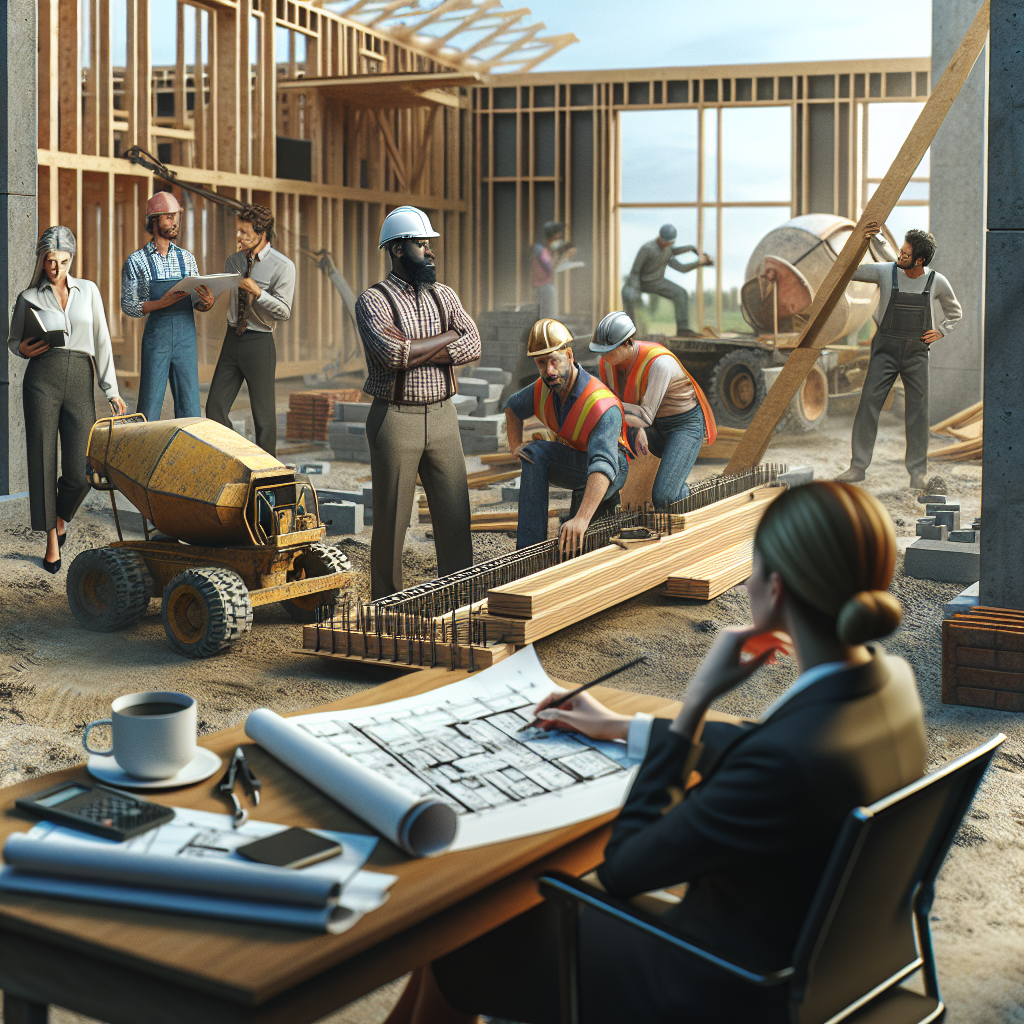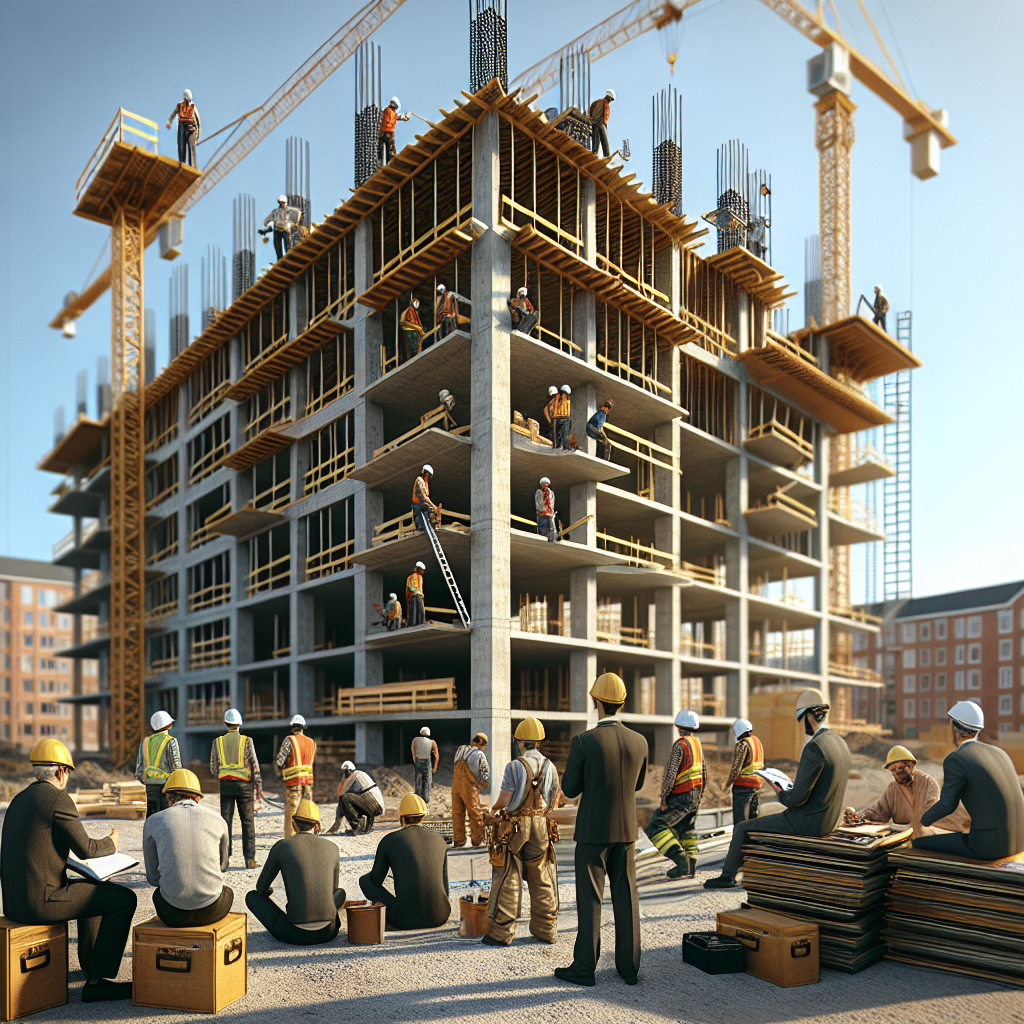When embarking on a new construction project, whether it’s remodeling your kitchen or building your dream home from the ground up, selecting the right contractor is pivotal to the success of your project. Ensuring that your contractor has the proper credentials, experience, and expertise not only sets a solid foundation for your construction but also provides peace of mind. In this comprehensive guide, we’ll walk you through the essentials of selecting a contractor who will bring your vision to life, safely and efficiently.
Understanding Contractor Credentials and Experience
Before you sign any contracts, it’s crucial to verify that your contractor is licensed and insured. This protects you from potential liabilities and ensures that the contractor meets industry standards. Additionally, consider the contractor’s years of experience and their track record with past projects. A portfolio of successful projects similar to yours is a good indicator of their capability and reliability.
- Verify credentials: Check local government websites or professional licensing boards to confirm the contractor’s licensing status.
- Read reviews: Look for feedback from previous clients on reputable review sites to gauge the contractor’s reputation and the quality of their work.
Assessing Project Compatibility and Contractor Expertise
It’s essential to match your contractor’s skills and area of specialization with the specific requirements of your new construction project. Contractors who specialize in new constructions often posses advanced knowledge in modern construction techniques and materials, which can be beneficial for your project.
- Ask the right questions: Inquire about their experience with projects similar to yours, and ask specific questions about their approach and the techniques they use.
Budgeting and Contract Essentials for New Construction
Discussing your budget openly with your potential contractor sets the stage for a transparent relationship. It’s important to understand all contract terms clearly—such as liabilities, project timelines, and warranties—to avoid any surprises during or after the completion of your project.
- Negotiate contract terms: Don’t hesitate to negotiate terms that better suit your needs and ensure there are no hidden costs.
By taking the time to thoroughly assess potential contractors, you’ll ensure that your new construction project is in good hands. Remember, the right contractor will not only meet your expectations but will also keep the project on time and within budget.

If you’re ready to take your home improvement or construction project to the next level, we can help! Find trusted contractors on BuildNet, whether you’re looking for renovations, new builds, electrical work, plumbing, or anything in between. Our directory connects you with qualified professionals who can make your vision a reality.
Understanding Contractor Credentials and Experience
When you’re gearing up to start a new construction project, whether it’s a dream home or a commercial space, the foundation of your success rests significantly on the credentials and experience of the contractor you choose. Here’s how to ensure you pick the right one!
Importance of Licensing and Insurance
First things first: always check that your contractor is licensed and insured. This isn’t just about compliance—though that’s crucial—it’s about peace of mind. A licensed contractor has met state or local jurisdiction requirements, which typically include passing competency tests in their field. Insurance, on the other hand, protects you from being liable for any accidents that might occur on your property. Make sure they have both liability and workers’ compensation insurance.
Evaluating Years of Experience and Past Project Success
Experience matters. A contractor with numerous years under their belt isn’t just someone who knows how to swing a hammer; they understand project management, can foresee and solve complex issues, and have a track record that can be assessed. When reviewing potential contractors:
- Look at their portfolio: Verify the types of projects they’ve completed. Do they align with what you’re planning?
- Check references: Speak to previous clients about their satisfaction with the projects. Were they completed on time and within budget?
How to Verify Credentials and Read Reviews Effectively
Verifying a contractor’s credentials can often feel like detective work, but it’s easier than you think. Most states have online databases where you can check the validity of a contractor’s license. As for reviews:
- Check multiple sources: Don’t rely solely on testimonials from the contractor’s website. Look at reviews on third-party sites like Yelp, Google, and industry-specific portals.
- Read between the lines: Look for reviews that mention specifics about the professionalism, communication, and quality of work. Be wary of overly vague or excessively glowing reviews without details.
Remember, choosing the right contractor is crucial for the success of your project. Take your time, do your homework, and get ready to turn those construction dreams into reality!

Assessing Project Compatibility and Contractor Expertise
Embarking on a new construction project can be as exhilarating as it is nerve-wracking. It’s like setting the foundation for a dream, but this dream can only take shape with the right hands at work. Here’s how you can ensure that the contractor you choose is not just skilled, but a perfect fit for your project.
Matching Contractor Skills with Your Project Requirements
Every construction project is unique, and so are the skills required to execute it flawlessly. Choosing a contractor whose expertise aligns with your project’s needs isn’t just a recommendation—it’s a necessity. For instance, if you’re building a custom home, a contractor experienced in large-scale commercial projects might not be the best choice despite their impressive portfolio. Residential construction requires a nuanced understanding of personal space planning and local residential codes.
- Check for Relevant Experience: Review their past projects to see if they align with the type and scale of your project.
- Ask for References: Speak to past clients about their satisfaction with the contractor’s work on projects similar to yours.
- Assess Their Portfolio: A visual of past projects can give you insight into the contractor’s craftsmanship and innovation.
The Significance of Specialization in New Construction
When it comes to new construction, specialization can greatly impact the quality and success of a project. Contractors who specialize in new builds often have a streamlined process, enhanced problem-solving skills specific to new constructions, and an adept understanding of modern materials and technologies. This expertise ensures they can handle the unexpected challenges that new constructions often present.
For instance, a contractor specializing in eco-friendly builds will be proficient in the latest sustainable building practices and materials. Their specific knowledge can help you achieve a greener home, often with cost-effective solutions that a general builder might not be aware of.
Questions to Ask Potential Contractors About Their Approach and Techniques
Once you’ve narrowed down your list of potential contractors, it’s crucial to dig a little deeper into their approach and techniques. This can be a deal-breaker if their way of working doesn’t align with your expectations or the demands of your project.
Understanding Their Process
Ask about their start-to-finish process. How do they initiate a project? What steps do they follow? This question reveals not only their organizational skills but also their transparency and willingness to keep you informed.
Communication and Problem-Solving
How will they communicate updates and issues? Effective communication is crucial in construction projects to ensure that any hitches are addressed promptly. Also, inquire about their approach to problem-solving in previous projects. It can give you insights into their expertise and adaptability.
Handling of Materials and Resources
What materials do they usually work with, and why do they prefer them? This question can help you understand their dedication to quality and innovation. Also, understanding how they source their materials can tell you a lot about their reliability and the sustainability of your project.
Choosing the right contractor for your new construction is not just about budgeting and timelines; it’s also about ensuring a synergy between your project’s requirements and a contractor’s expertise and approach. By carefully evaluating these aspects, you set the stage for a construction process that is as smooth and stress-free as possible. Remember, a good match can lead to not just a well-built home but also a truly enjoyable building experience.
Budgeting and Contract Essentials for New Construction
When you’re embarking on a new construction project, whether it be a cozy bungalow or a sprawling commercial complex, the excitement can quickly turn into a headache if the budgeting and contract details aren’t handled with care. Let’s dive deep into how you can make this critical phase as smooth as possible. Remember, a well-planned budget and a clear contract are your best defenses against any potential project pitfalls!
Discussing and Planning Your Budget with a Contractor
It’s crucial to have an open dialogue about your budget early on. The first step is to ensure you and your contractor are on the same page regarding the scope and vision of the project. Be clear about what you can afford, and don’t shy away from discussing financial constraints. Here’s how to handle this tactfully:
- Be Transparent: Honesty about your budget from the get-go can help prevent any misunderstandings later on.
- Get Itemized Quotes: Ask for a detailed breakdown of costs. This transparency helps you understand where your money is going and aids in comparing bids if you’re still deciding on a contractor.
- Consider Unexpected Costs: Always allocate around 10-15% of your budget for unforeseen expenses. Construction projects are notorious for surprises!
Remember, if a quote seems too good to be true, it probably is. Opting for the cheapest bid might save you some cash initially but could lead to higher costs down the line due to poor quality work or materials.
Understanding Contract Terms: Liabilities, Timelines, and Warranties
Contracts can be dense and laden with legalese, but they’re essential for defining the responsibilities, timelines, and legal liabilities of both parties. Here’s what you need to focus on:
- Liabilities: Clarify who is responsible for what, especially in cases of accidents or construction failures. Liability insurance is a must.
- Timelines: Your contract should include a realistic timeline for the project, including start and completion dates. Make sure there are provisions for delays, which are common in construction.
- Warranties: Understand the warranties provided by your contractor. This includes warranties on materials and labor. Make sure these are written into the contract.
Don’t hesitate to involve a legal expert to review the contract before you sign. This might add to the initial cost but can save you from significant legal headaches later.
Tips for Negotiating the Best Contract Terms and Avoiding Hidden Costs
Negotiating a contract can feel daunting, but it’s your opportunity to ensure the agreement reflects your interests. Here are some tips to keep in mind:
- Everything Is Negotiable: Don’t accept the first draft of the contract as final. Discuss terms that concern you and negotiate adjustments.
- Clarify Cost Structure: Make sure the contract specifies whether the project is on a fixed-cost, cost-plus, or time-and-materials basis. Each has its own set of implications for budget management.
- Ask for References: A reputable contractor should be able to provide references or examples of similar projects they’ve completed. This can give you an idea of their handling of contracts and financial dealings.
By being well-informed and proactive about discussing, planning, and negotiating your construction contract, you set the stage for a process that’s more likely to run smoothly and stay within budget. Remember, the goal is not just to start well but also to finish well, with a beautifully completed project that aligns with your vision and financial expectations!

What are the benefits of hiring a licensed and insured contractor?
Choosing a licensed and insured contractor offers multiple benefits. Primarily, it ensures that the contractor meets the industry’s regulatory standards and follows safety regulations. Insurance provides a safety net for both you and the contractor in case of accidents or damage to your property. This means you’re less likely to face unexpected liabilities and costs.
How can I verify a contractor’s credentials?
Verifying a contractor’s credentials can be done by asking for their license number and checking it against your local or national licensing board’s database. Additionally, you can request proof of insurance and ensure it’s current. Reading reviews from past clients on reputable platforms like BuildNet can also provide real insights into their reliability and quality of work.
What questions should I ask to ensure a contractor is a good fit for my project?
To determine if a contractor is suitable for your project, ask detailed questions about their experience with similar projects, their approach to project management, and how they handle unforeseen issues. It’s also wise to inquire about their team and the subcontractors they might involve.
Why is specialization important in new construction projects?
Specialization is crucial because it ensures the contractor has the specific skills and knowledge required for new construction, which often involves more complex codes and regulations than renovations or simple repairs. A specialized contractor will be more adept at navigating these complexities efficiently.
How should I discuss the budget with my contractor?
Openly discussing your budget with your contractor from the beginning sets clear expectations. Provide them with your maximum budget and ask for a detailed breakdown of costs, including materials, labor, and any potential extra charges. This transparency helps prevent misunderstandings and keeps the project within financial boundaries.
What are the key contract terms I should understand before signing?
Before signing a contract, ensure you understand the terms related to liabilities, timelines, and warranties. Ask for clarification on any jargon or clauses you don’t understand. It’s crucial to know what is covered under the warranty and what your responsibilities are in maintaining the terms of the contract.
Any tips for negotiating contract terms to avoid hidden costs?
To avoid hidden costs, request a contract that itemizes all potential expenses. During negotiations, ask if there can be a clause that any additional costs not initially discussed must be approved by you before proceeding. This ensures you maintain control over your budget.
Conclusion
Embarking on a new construction project can be exhilarating yet daunting. The key to a successful project lies in choosing the right contractor, one who is not only skilled and experienced but also a good fit for your specific needs. Remember to verify their credentials, discuss your budget openly, and understand the terms of your contract thoroughly.
At BuildNet, we understand the importance of trust and professionalism in building and construction projects. That’s why we offer a directory filled with qualified, vetted contractors who are ready to help turn your vision into reality. Whether you’re building from scratch or embarking on a major renovation, our professionals are here to guide you every step of the way.
Don’t hesitate to contact a contractor through BuildNet for a free quote today. Let us help you build a solid foundation for your future!







